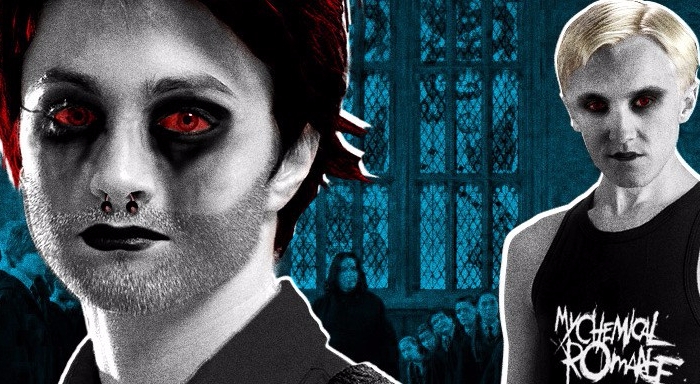I had a pretty shitty childhood and that’s putting things mildly. When I was seven my dad killed himself, but I don’t blame him, he was an addict and because of that he developed schizophrenia. Voices in his head told him to hurt me and my mom, if he were able to think clearly he wouldn’t have done it. Because of my history with it I take suicide and mental illness very seriously, it’s in my opinion that if you’re in a place where you can actually go through with it that it wasn’t your fault. People call it the easy way out but I don’t see how that’s possible, staring down death has to be terrifying. Anyway I digress, after my dad passed away my mom was a wreck, and again I don’t blame her. She was an addict too, not the usual bored housewife kind that self prescribes xanies or valium, the hard-core Midwestern kind of addict.
Before watching countless documentaries and becoming a ravenous Breaking Bad fan I had already seen the inside of several meth houses although I didn’t know it at the time. My mom later cleaned up and got her shit mostly together, she stopped doing drugs but found a new addiction in a website called MocoSpace, which was a mediocre chat site which catered to people with a disturbing lack of a life and an excess amount of time. Her day consisted mostly of “flaming” other losers on the internet usually by taking their “pics” and editing them with this weird bootlegged looking dollar bin version of photoshop, she would edit in really shitty clip art that came with the program onto their pictures which, for some reason, infuriated them to no end.
So to sum up my childhood in a sentence: my dad was dead and my mom was incredibly distant. I didn’t have many friends at the time, kids in elementary school didn’t want to get close to the weird fat kid with the dead dad, but it was pretty much whatever. I had a few friends, but they were just school friends. I’d only ever hang out with other kids when it was my birthday, and I’m fairly certain that’s only because their parents told them too, but again, it was pretty much whatever.
Fuck.
I got off topic again. Basically the message I’m trying to push here, is that as a child I had to keep myself entertained, and how I would do that, dear reader, is by writing and watching movies. When I was young my favorite movie was probably Dogma a religious satire made by Kevin Smith. Dogma was probably my favorite when I was younger because I had serious doubts in god at the time, plus it was hilarious, who the fuck doesn’t love dogma? When I grew up a little I saw Mallrats, another Kevin Smith movie and fell in love, it felt like that movie was made for me. At around the sixth grade I discovered the joys of loitering, I got to walk around our local mall since it was within walking distance from my apartment and just hang out. I felt like Brody, and it was great. In high school I watched Clerks and I knew what I wanted to do with my life, I wanted to make films.
To this day Clerks remains my favorite movie, not because it’s the best movie I’ve ever seen or anything like that. Far from it actually, that movie blows. The quality is bad, the audio is bad, and the acting is…well the acting is actually pretty solid. I don’t blame Kevin Smith for making a shitty looking movie; he had $27,000 to make it, which is a non-budget in the film world. Steven Spielberg wipes his ass with $27,000 dollar bills for god’s sakes. The reason Clerks made me want to make movies was that, and I’ll never forget this, I got done watching it and was just like “this was a successful movie? This is what launched my favorite film maker’s career? Well… I could do better than that.”
Some people have heroes like Ghandi, ya’ know, people that made these big sweeping changes to the world around them. My hero is Kevin Smith, the guy who made Clerks, the guy who talks about cum a lot, and the guy that really put it in my head that I didn’t want to die screaming and have nothing to show for it. Let me contextualize this for a second, Kevin Smith’s dad, Don Smith, “worked at the U.S Postal Service and hated it like a jihadist” (Smith, 3) and “he raised three kids on a meager post office salary doing a job he abjectly detested…The least the universe could’ve done for this guy was to put him to bed quietly.” (Smith, 7) but instead he died screaming as he stared down massive heart failure. Now this is where Kevin Smith drops a massive truth bomb: “In the face of such hopelessness as out eventual, un-avoidable death, there is little sense in not at least trying to accomplish all of your wildest dreams in life.” (Smith, 7)
This might seem fairly obvious to everyone else, like, “try for your goals? Of course!” but growing up I never really got encouragement for that kind of thing, even to this day my grandma likes to subtly hint that I should become a therapist so I can “analyze” our family, she’d do this after every single family blowout, usually within earshot of whoever she was arguing with. My grandma was pretty passive aggressive and it never took a PHD in psychology to figure that one out. Anyway…uh…where was I going? Oh. Realistic goals, right. I remember one time I was staying with my aunt and uncle for a while because my mom and step dad (at the time) had gotten into an earth shattering fight, he called her an “Adderall junkie” and she said that she didn’t like being called a “fat cunt”, being hit, and seeing him drink all the time, unreasonable demands I know. So I split because it was going on nightly and there wasn’t a whole lot of time to be the midnight fight mediator and study.
At the time I wanted to be a comedian because I was depressed and loved getting kicked in the teeth by rejection and I was pretty funny too so I said “well I’d better chase ‘dem dreams!” And chase ‘dem dreams I did not. After getting really jazzed up about my new found career choice I decided to announce my life plans to my middle class aunt in medical sales and my uncle in construction work and surprise surprise they weren’t thrilled. At first they acted pretty supportive but warned me about the hard work I’d be facing, which I was totally ok with. The next day I went down stairs for breakfast before school and saw a printed page on the table “huh, what’s this” I thought with curious delight. I will never forget what was on the page: Why Following Your Dreams is one of the WORST Career Moves You Can Make. It was pretty clear what direction they wanted me to move in career wise.
I chose to stick with my aspirations despite the passive aggressive play pretty much just to spite them. I have this big problem with authority for some reason; I don’t like doing what people tell me to do, but this time was different. Seeing that article on the table really really REALLY rubbed me the wrong way so I was going to be an unbreakable wall of will power. I wasn’t going to back down. I was going to become a comedian.
Later on it turned out to be just a phase, I didn’t actually want to become a comedian. That shit’s hard and I didn’t/don’t have the stage presence or confidence to even think about trying that. But story teller? That was something I could do, and Smith’s advice to try for it really got to me. I don’t want to die screaming with nothing to show for it, and in this world good men die screaming.
I knew with certainty what I wanted to do with my life after seeing Clerks with grown up eyes the same way Smith knew what he wanted to do after seeing Richard Linklater’s Slacker. In the book The Film That Changed My Life Kevin Smith cited Slacker as the film that changed his, it was “insanely liberating for [him], and very inspiring. Because it was like, ‘So you can make a movie about anything, apparently.’ ” (Smith) and three years later he did just that with a film about two register jockeys Dante and Randal, based on him and his good friend Bryan Johnson respectively. Almost all of Smith’s films are very personal to him, Clerks and Mallrats were both films made with his friends in mind knowing that nobody else was going to make a movie about them, Dogma was about him growing up catholic, and Chasing Amy (his most mature film) was about his own sexual insecurities. Kevin Smith described his early film making process as “taking [his] heart, chunky pieces of [his] heart out, slapping them on a platter projecting it and saying ‘do you understand?’” (Smith, Masterclass) So watching Smith’s movies and falling in love with them all those years ago I was falling in love with Smith (strictly platonic I swear.) When I figured that out, I knew what I wanted to do more than ever, I wanted to write for myself, I didn’t give a shit about making mainstream garbage, I didn’t want to be Michael Bay or Steven Spielberg, I wanted to be Kevin Smith.
Continue reading “Professional Profile: How the Guy Who Made Clerks Inspired Me to Do Good” →











